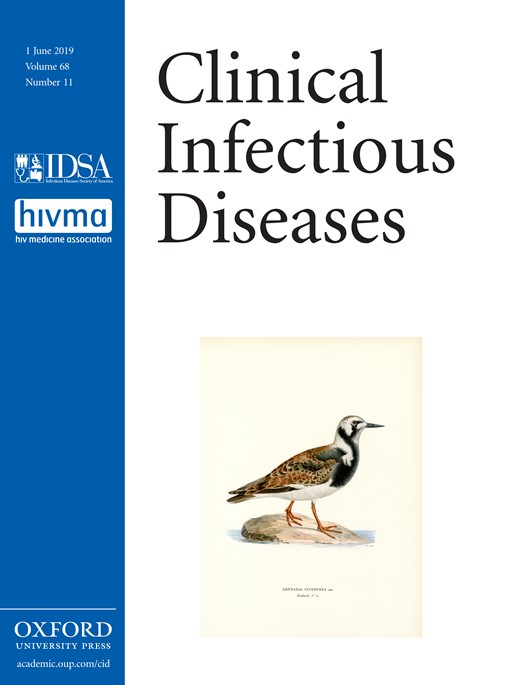-
PDF
- Split View
-
Views
-
Cite
Cite
Prashanth S Ramachandran, Fiona V Cresswell, David B Meya, Charles Langelier, Emily D Crawford, Joseph L DeRisi, David R Boulware, Michael R Wilson, Detection of Cryptococcus DNA by Metagenomic Next-generation Sequencing in Symptomatic Cryptococcal Antigenemia, Clinical Infectious Diseases, Volume 68, Issue 11, 1 June 2019, Pages 1978–1979, https://doi.org/10.1093/cid/ciy1024
Close - Share Icon Share
To the Editor—Ssebambulidde and colleagues recently described a unique subset of human immunodeficiency virus (HIV)–seropositive persons who presented with symptoms of meningitis and positive serum cryptococcal antigen (CrAg) but negative cerebrospinal fluid (CSF) studies. Overall, 4% (49/1201) presented with symptomatic antigenemia with negative CSF CrAg and culture [1]. The authors postulated that such cases of clinically symptomatic cryptococcal antigenemia were likely early cryptococcal meningitis that was undetectable by traditional microbiologic testing.
Our group conducts research that focuses on improving current diagnostics for patients with neuroinfectious disorders by utilizing metagenomic next-generation sequencing (mNGS). mNGS has demonstrated the capability to detect Cryptococcus along with other bacterial, viral, and fungal pathogens [2, 3]. In a recent pilot study, we collaborated to perform mNGS on 9 CSF samples from a Ugandan patient cohort: 4 cases of confirmed Mycobacterium tuberculosis meningitis, 1 case of CSF CrAg-positive cryptococcal meningitis, 1 paradoxical cryptococcal immune reconstitution inflammatory syndrome (IRIS), and 3 cases of cryptococcal antigenemia with symptoms of meningitis who were negative on all CSF microbiological tests including CrAg, fungal culture, GeneXpert MTB/Rif, Xpert MTB/Rif Ultra, and tuberculosis culture.
We extracted DNA from the CSF samples and converted to Illumina libraries using the NEBNext Ultra II DNA library preparation kit before sequencing on an Illumina NextSeq instrument using 150/150 base pair paired-end sequencing. Bioinformatic analysis was performed with the IDseq pipeline (www.idseq.net) with reads to suspect pathogens confirmed through the National Center for Biotechnology Information Basic Local Alignment Search Tool. Our results demonstrated 100% concordance in the positive control cases of Mycobacterium tuberculosis meningitis (n = 4) as well as detection of Cryptococcus neoformans in the 1 CSF CrAg-positive meningitis case. No reads to Cryptococcus were detected in the patient with paradoxical IRIS. We detected low abundance Cryptococcus neoformans var. grubii reads (0.2–19.8 reads per million) in the CSF of all 3 patients with symptomatic cryptococcal antigenemia and symptoms of meningitis. No tuberculosis or Cryptococcus reads were detected in the negative control water sample.
Though only preliminary data from a small pilot, these data support the argument that a subset of HIV-seropositive, cryptococcal-antigenemic patients with meningismus are likely presenting with an initial symptomatic response to neuroinvasive disease and are currently being missed by standard CSF-focused microbiological testing. Our preliminary data suggest the potential utility of mNGS for detection of Cryptococcus in the central nervous system, even at very low abundance. Additional large-scale studies are required to clarify the underlying biology in this subgroup and to define the optimal management of such patients. Until then, we agree with the authors that these symptomatic antigenemic persons are manifesting early cryptococcal meningoencephalitis and should therefore be treated as such to improve their survival.
Notes
Financial support. D. R. B.: National Institute of Neurological Disorders and Stroke (R01NS086312) and Fogarty International Center (R25TW009345). M. R. W.: National Institute of Neurological Disorders and Stroke (K08NS096117). F. V. C.: Wellcome Trust (M007413/1). D. M.: Wellcome Trust (107742/Z/15/Z), DELTAS Africa Initiative grant (DEL-15-011). C. L.: National Heart, Lung and Blood Institute (K23HL138461-01A1). P. R.: Australian Government Research Training Program Scholarship.
Potential conflicts of interest. All authors: No reported conflicts of interest. All authors have submitted the ICMJE Form for Disclosure of Potential Conflicts of Interest. Conflicts that the editors consider relevant to the content of the manuscript have been disclosed.





Comments